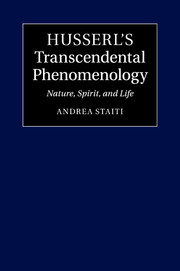Crossref Citations
This Book has been
cited by the following publications. This list is generated based on data provided by Crossref.
Staiti, Andrea
2015.
Husserl and Rickert on the Nature of Judgment.
Philosophy Compass,
Vol. 10,
Issue. 12,
p.
815.
2015.
Books Received.
Philosophy,
Vol. 90,
Issue. 2,
p.
363.
Petranovich, Sean
2018.
Trust and Betrayal from a Husserlian Standpoint.
International Journal of Philosophical Studies,
Vol. 26,
Issue. 2,
p.
251.
Clarke, Evan
2019.
A Companion to Nineteenth‐Century Philosophy.
p.
389.
van Mazijk, Corijn
2019.
Husserl’s covert critique of Kant in the sixth book of Logical Investigations.
Continental Philosophy Review,
Vol. 52,
Issue. 1,
p.
15.
Cazzanelli, Stefano
2020.
The Relevance of Natorp’s Criticism of Husserl to the Hermeneutical Transformation of Heidegger’s Phenomenology.
Problemos,
Vol. 98,
Issue. ,
p.
8.
Bedoya Rodas, Carlos Arturo
2020.
Consideraciones sobre el concepto de destrucción fenomenológica en Martin Heidegger. A cien años de las lecciones de 1919-1920.
Estudios de Filosofía,
p.
35.
Hartimo, Mirja
2020.
Husserl’s Transcendentalization of Mathematical Naturalism.
Journal of Transcendental Philosophy,
Vol. 1,
Issue. 3,
p.
289.
Keane, Niall
2021.
Linguisticality and Lifeworld: Gadamer’s Late Turn to Phenomenology.
International Journal of Philosophical Studies,
Vol. 29,
Issue. 3,
p.
370.
Averchi, Michele
2021.
The Idealism-Realism Debate Among Edmund Husserl’s Early Followers and Critics.
Vol. 112,
Issue. ,
p.
173.
Zhang, Junguo
2021.
Transcendental Co-originariness of Subjectivity, Intersubjectivity, and the World: Another Way of Reading Husserl’s Transcendental Phenomenology.
Human Studies,
Vol. 44,
Issue. 1,
p.
121.
Vecino, María Celeste
2021.
Nature, Spirit, and Spirituality in Husserl’s Phenomenology.
Religions,
Vol. 12,
Issue. 7,
p.
481.
Hartimo, Mirja
2021.
Husserl and Mathematics.
Terzi, Pietro
2022.
Brave new lifeworld: vicissitudes of the Lebenswelt in French “phenomenology” and beyond.
Continental Philosophy Review,
Vol. 55,
Issue. 4,
p.
447.
Jardine, James
2022.
Empathy, Embodiment, and the Person.
Vol. 233,
Issue. ,
p.
121.
Jardine, James
2022.
Empathy, Embodiment, and the Person.
Vol. 233,
Issue. ,
p.
161.
Galanti Grollo, Sebastiano
2022.
Rethinking Husserl’s lifeworld: The many faces of the world in Heidegger’s early Freiburg lecture courses.
Continental Philosophy Review,
Vol. 55,
Issue. 4,
p.
487.
Jardine, James
2022.
Empathy, Embodiment, and the Person.
Vol. 233,
Issue. ,
p.
1.
Englander, Magnus
2023.
Bioethics, Sociality, and Mental Illness.
The Journal of Medicine and Philosophy: A Forum for Bioethics and Philosophy of Medicine,
Vol. 48,
Issue. 2,
p.
161.
Džanić, Denis
2023.
Transcendental Phenomenology as Human Possibility.
Vol. 237,
Issue. ,
p.
1.



